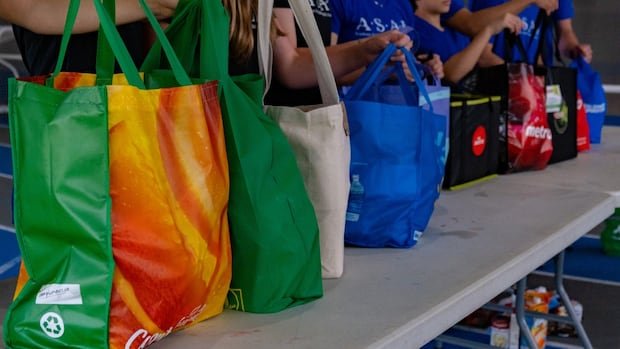In cabinets, cars, and kitchens everywhere, reusable grocery bags are becoming a common sight. With the increasing bans on plastic bags at various levels of government in Canada, shoppers are faced with a multitude of options when it comes to choosing their bags at the store. To determine which type of bag is the most durable, a test was conducted by the team at Marketplace.
According to the Canadian government, bags containing plastic are considered reusable if they can endure 100 trips of 53 meters each while carrying 10 kilograms without tearing or breaking. Despite this regulation being challenged by the plastics industry in court, Marketplace decided to investigate which bags available at Canadian retailers met this durability benchmark. Bags were purchased from Sobeys, Real Canadian Superstore, Dollarama, Walmart, and Metro, and a single-use plastic bag was included for comparison.
On a track in Whitby, Ont., student athletes were assigned bags and 10 kilograms of groceries each to simulate a typical shopping trip. Students unpacked and repacked the bags every 53 meters during the test. Out of the 12 bags tested, seven failed, including the single-use plastic bag.
Thinner cloth reusable bags failed before reaching 100 trips, with one from Sobeys tearing after only five trips. However, a sturdy cotton tote bag from Dollarama lasted the full 100 trips without any damage. Generally, thicker plastic bags showed better durability.
In response to the test results, Walmart and Dollarama stated that their reusable bags meet government standards through independent testing. Metro mentioned that their T-shirt style bags are designed for lighter loads and offers stronger alternatives for heavier groceries. Sobeys and Loblaw did not provide any comments.
Karen Wirsig from Environmental Defence expressed concerns about companies producing bags that may not meet environmental standards. Marketplace attempted to interview Environment Minister Julie Dabrusin regarding the issue, but her office declined, stating that they are awaiting the resolution of the legal battle over the proposed regulations.
Experts suggest that using the bags you already own is the best approach for now. Reusable bags should offset their carbon footprint to be truly environmentally friendly. Single-use plastic bags, despite being a significant source of litter, have a relatively low carbon footprint compared to materials like cotton.
Industry changes are being urged by advocates like Wirsig to promote a more circular approach to bag usage. Suggestions include reusing shipping boxes from grocers and implementing free reusable bag programs. Wirsig also recommends repurposing old bags as trash bin liners to extend their usefulness.
In conclusion, the key message is to prioritize reducing, reusing, and recycling existing bags, rather than constantly seeking new replacements.

